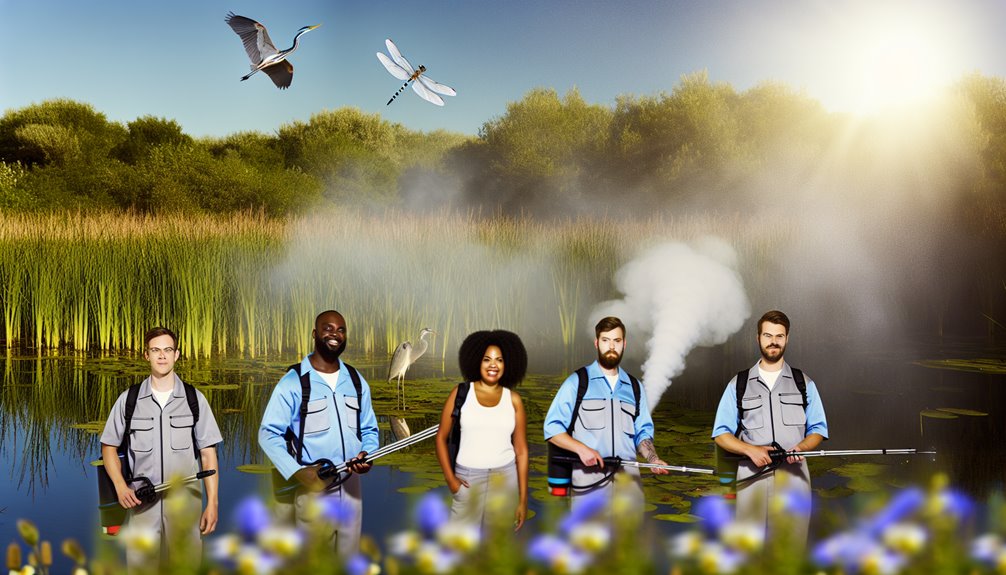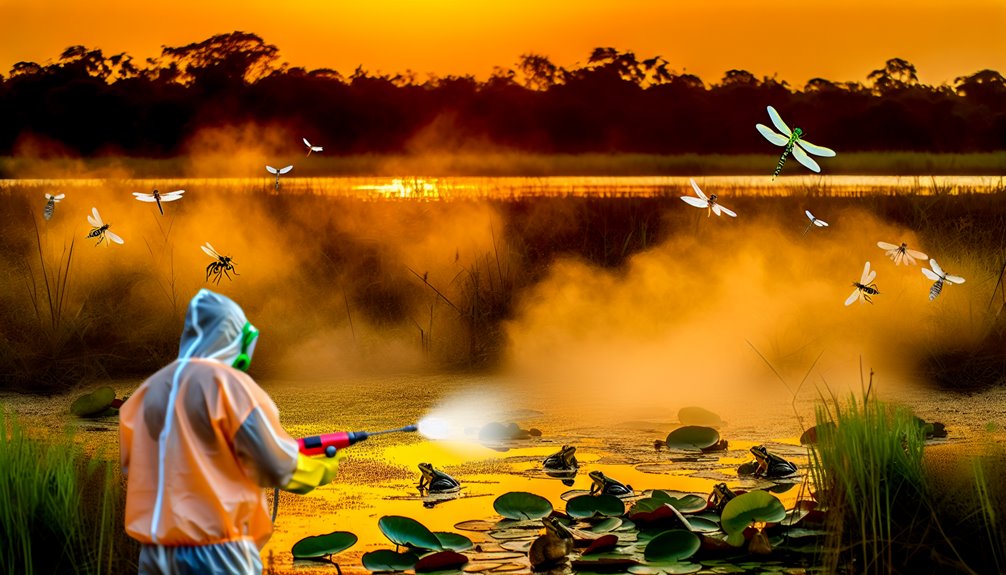Like a silent guardian, mosquito services play an essential role in safeguarding local wildlife. By managing mosquito populations, they reduce disease transmission and help maintain balanced ecosystems. This fosters harmony among various species and supports the intricate web of life. But how exactly do these services contribute to the health and sustainability of wildlife? Exploring this connection reveals the depth of their impact on our environment.
Reducing Disease Transmission Among Wildlife

Although wildlife plays an essential role in maintaining ecosystem balance, it can also be a vector for diseases that affect both animals and humans. Effective disease control measures are vital for safeguarding wildlife health.
By monitoring and managing wildlife populations, you can reduce the transmission of diseases that could have detrimental impacts on both ecosystems and human communities. Implementing targeted interventions, such as vaccination programs and habitat management, can greatly lower disease prevalence among wildlife.
In addition, educating the public about the importance of maintaining healthy wildlife populations fosters a sense of responsibility. When you prioritize disease control in wildlife, you’re not only protecting animals but also enhancing overall ecosystem stability, which ultimately benefits everyone.
Supporting Pollinator Populations
Healthy wildlife populations contribute to the stability of ecosystems, and supporting pollinator populations is a key aspect of this balance.
Mosquito services play an essential role in maintaining healthy environments conducive to pollinator habitats. By reducing mosquito populations, these services help guarantee that beneficial insects, such as bees and butterflies, can thrive without excessive competition or disease spread.
Engaging in sustainable gardening practices can further enhance these habitats, as native plants attract diverse pollinators. You can support these efforts by planting pollinator-friendly flora and minimizing pesticide use.
Maintaining Balance in the Food Chain

Maintaining balance in the food chain is vital for sustaining diverse ecosystems, as each species plays a specific role in the web of life.
Mosquito services contribute to this balance by managing populations that can disrupt predator prey dynamics. When mosquito populations surge, they can overwhelm their natural predators, leading to a decline in those species.
This imbalance threatens ecosystem resilience, as fewer predators may result in unchecked herbivore populations, causing further ecological degradation.
By controlling mosquito numbers, these services help guarantee that native predators thrive, maintaining the vital interactions that sustain local wildlife.
Ultimately, promoting this balance fosters healthier ecosystems, supporting a variety of species and enhancing biodiversity, which benefits the environment as a whole.
Protecting Endangered Species
As mosquito services play an essential role in ecosystem management, they inadvertently contribute to the protection of endangered species. By controlling mosquito populations, these services help maintain a balanced habitat where vulnerable species can thrive.
Effective habitat conservation strategies guarantee that important environments remain intact, allowing endangered species to find food and shelter without excessive competition or disease. Additionally, regular species monitoring allows conservationists to track the health and population dynamics of at-risk species. This data is significant for implementing targeted interventions that can enhance their survival chances.
Promoting Healthy Breeding Grounds

While ensuring the right conditions for mosquito control is essential, promoting healthy breeding grounds is equally important for the overall ecosystem.
By engaging in habitat restoration, you can improve local environments that support diverse wildlife, including beneficial insects and pollinators. These efforts not only foster natural predator-prey relationships but also help maintain ecological balance.
Environmental education plays a vital role here; by informing the community about the importance of clean and sustainable habitats, you inspire collective action.
Encouraging practices like reducing stagnant water and planting native vegetation creates ideal conditions for wildlife.
Ultimately, your commitment to these initiatives enhances biodiversity and contributes to a thriving ecosystem, benefiting both wildlife and the community as a whole.
Minimizing Habitat Disruption
To effectively minimize habitat disruption, it’s crucial to recognize the delicate balance between mosquito management and local wildlife preservation.
When you engage with mosquito services, they often prioritize habitat preservation, ensuring that treatments target only problematic areas. This approach not only controls mosquito populations but also safeguards the surrounding ecosystem.
By employing environmentally-friendly methods, such as targeted sprays and biological control agents, you can play a role in ecosystem restoration. These strategies help maintain the integrity of local habitats, benefiting various species that rely on these environments for survival.
Ultimately, your involvement with mosquito services can lead to healthier ecosystems and a thriving wildlife population, proving that effective mosquito management and wildlife conservation can coexist harmoniously.
Enhancing Biodiversity
Enhancing biodiversity is essential for creating resilient ecosystems, and effective mosquito management plays a pivotal role in this process.
By controlling mosquito populations, you help maintain habitat connectivity, which is vital for various species to thrive. When these habitats are interconnected, wildlife can migrate, find food, and reproduce more effectively, leading to improved species resilience.
Additionally, by reducing mosquito-borne diseases, you protect not only human health but also the health of local wildlife. This creates a balanced ecosystem where different species can coexist and support each other.
Your commitment to effective mosquito management contributes greatly to preserving biodiversity, ensuring that habitats remain vibrant and resilient for future generations.
Together, we can foster a healthier environment for all living beings.
Preventing Water Contamination
Preventing water contamination is essential for maintaining both human and ecological health, especially in areas where mosquitoes breed. You can take proactive steps to guarantee clean water by incorporating effective water filtration systems. These systems help trap pollutants and prevent harmful substances from entering local waterways.
Chemical runoff from agricultural or urban areas can markedly impact water quality, leading to detrimental effects on wildlife. By utilizing mosquito services that emphasize environmentally-friendly practices, you reduce the risk of introducing harmful chemicals into the ecosystem.
Regular monitoring and treatment of stagnant water sources also play a pivotal role in protecting water quality. Together, these measures contribute to a healthier environment, supporting both local wildlife and community well-being.
Supporting Natural Predators
While many people focus on eradicating mosquitoes through chemical treatments, supporting natural predators can be a more sustainable approach to managing mosquito populations.
By fostering natural habitats, you can encourage birds, bats, and other predators that thrive on mosquitoes. These creatures play an essential role in the predator-prey dynamic, helping to keep mosquito numbers in check without harming the environment.
Creating a balanced ecosystem not only benefits wildlife but also reduces the need for chemical interventions, which can disrupt local flora and fauna. You can enhance these natural habitats by planting native vegetation and providing water sources.
Supporting these natural predators ultimately leads to healthier ecosystems, ensuring that both wildlife and humans can coexist harmoniously.
Encouraging Sustainable Ecosystem Management
To foster a thriving environment for both wildlife and humans, it’s vital to promote sustainable ecosystem management practices. By implementing these sustainable practices, you can enhance ecosystem resilience, guaranteeing that natural habitats remain robust and diverse.
Mosquito services play an essential role by reducing pest populations while minimizing harm to beneficial organisms. When you support these services, you’re also contributing to habitat preservation, creating a balanced ecosystem where wildlife can flourish.
Educating the community about the importance of native species and their roles in the ecosystem further strengthens this initiative. By working together to adopt sustainable practices, you not only protect local wildlife but also secure a healthier environment for future generations, fostering a harmonious relationship between nature and humanity.
Conclusion
In conclusion, I truly believe that mosquito services are vital protectors of our precious ecosystems. Just like a conductor brings together the unique talents of each musician, our efforts help maintain the delicate balance of wildlife populations and preserve their habitats. With effective mosquito management reducing disease transmission significantly, we’re not just safeguarding animals; we’re nurturing a healthier environment for all of us. I invite you to join me in this important mission! Visit us at mosquitoeliminatorsms.com or give us a call at (601) 336-2277 to learn more about how we can work together to ensure a vibrant future for our local wildlife and communities. Let’s make a difference together!

